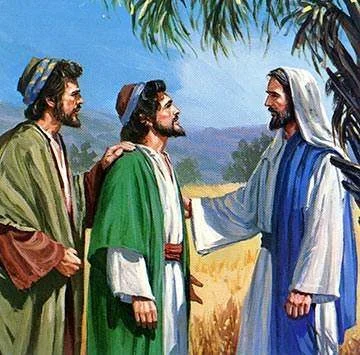Thirtieth Sunday in Ordinary Time
/Dominica XXX per Annum B
28 October 2018
Upon receiving his sight the Gospel tells us that Bartimaeus “followed [Jesus] on the way.” The Scripture readings chosen for this Holy Mass are marked by several allusions to the good things that are possible when we follow the path of the Lord, as compared to the distance and exile from God that we create when we sin and choose to stray along our own path.
I want to point you to the Gospel for the first allusion to the good that is possible when we remain faithful to following the way of God. The Gospel selection tells us that “Jesus was leaving Jericho with his disciples and a sizable crowd.” The larger context in this section of St. Mark’s Gospel informs us that Jesus is going to Jerusalem where he will arrive for the Passover. Jews in Palestine (at least those who were able) would make annual pilgrimage to the Holy City Jerusalem to observe the Passover. And what did the Passover commemorate? God’s goodness and faithfulness in leading His people along the pathway out of Egypt and toward the Promised Land. We can conclude that this sizeable crowd that passes by Bartimaeus is made up of many pilgrims on the joyful procession to Jerusalem where they will commemorate following faithfully the path of God. This allusion to the blessing that is possible when we follow God’s ways is amplified when you consider the location named in the Gospel: Jericho. What is significant about that city? It was the site of Israel’s first conquest in the holy land as they began to take possession of what God had promised. That familiar conquest story is recounted in Joshua 6 when, by God’s power, the Israelites conquered Jericho after a seven-day liturgical march around the city, carrying the Ark of the Covenant, blowing horns and shouting as the walls of the fortified city fell. Thus, this Gospel wants to make us think about the blessing that came when God’s People followed His lead.
The Scripture selections also allude to the distance and exile from God that comes when we stray and follow our own path. We can’t help but recall that Israel’s history is also marked by wandering in the desert and distance from God, a distance we too experience when we choose to sin and to stray from where God leads. For this we can look at the first reading from the Prophet Jeremiah and also the psalm. The first reading makes reference to Israel’s exile to the land of the north. They were scattered and driven from the Promised Land after being unfaithful in their choice to adopt pagan ways rather than living according to God’s ways. The first reading is a prophesy of joy when the Lord will deliver the remnant of Israel and bring them back, gathering His people as an immense throng, “with the blind and the lame in their midst.” The Prophet Jeremiah says that though God’s people were exiled in tears, God will console them and guide them, and lead them so that none shall stumble.
The example of Bartimaeus in the Gospel is an invitation to us to recognize our blindness and the obstacles that cause us to stumble and to stray from the direct path Jesus opens before us. The example of Bartimaeus is an invitation to us to throw aside the cloak of our old ways, the sins and the lack of love for Jesus that contribute to our sitting on the roadside and failing to advance in the way of holiness. The example of Bartimaeus is an invitation to us to hear the repeated message of being called by Jesus and called by His Church to join the great procession that is the way of the Lord, the way that leads to Heaven. In the past many weeks’ gospel selections, where Jesus has taught his disciples on the way to Jerusalem, we have seen their blindness toward the way he will be the Messiah. Today we hear of the blindness of Bartimaeus. God’s Word invites us to recognize our own spiritual blindness and the obstacles in our lives to following Jesus on the way. Jesus always stands ready to pause his journey and to heal us if we will call out and come to him. When we stray from the path and refuse to call out to Jesus we remain blind, distant from God, and sitting idly along the road. When we reject the voices that tell us to be silent and instead call out like Bartimaeus then we are taking the first steps to correct our course and to join the procession of Jesus toward freedom and entrance into the Promised Land of heaven. Just as in the Gospel, both Jesus and his Church call us to rise and to come close to Jesus. If we desire greater sight and the ability to follow Jesus on the way, may we learn to cry out in faith: “Jesus, son of David, have pity on me!”


